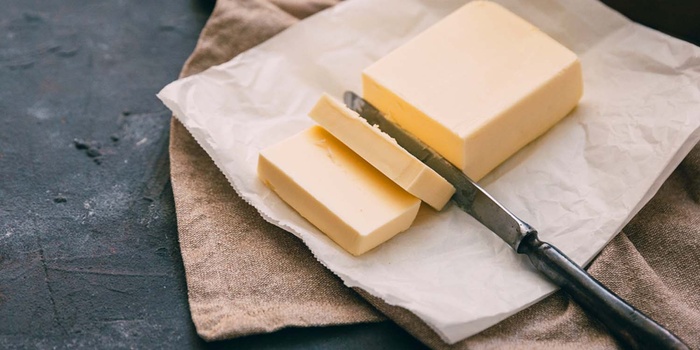Grass-Fed Butter: Unveiling Nutrition Facts, Health Benefits, and Culinary Uses
Nov 26, 2023 By Madison Evans
Butter is essential to a healthy diet for all ages and body types. However, grass-fed butter has been under discussion for some time compared to regular butter. Its nutritional content is one of the main reasons it has been preferred over traditional butter.

Adding average amounts of grass-fed butter can enhance your regular energy levels and make you feel more productive. This article will teach you about nutritional facts, health benefits, and uses of grass-fed butter.
Grass Fed Butter: All You Need to Know
By the end of this discussion, you will know that the hype about grass-fed butter is truly justifying because it is rich in nutrient content and has unlimited health benefits. Before delving into nutritional value, let's see the basic difference between grass-fed butter and regular butter:
Grass-fed butter Vs. Regular Butter
You must have seen extensive debates on regular butter and grass-fed butter these days, and think about the difference. The difference lies in cows' diet; grass-fed butter is derived from the milk of cows that only live on grass diets. It is a traditional and organic diet. On the other hand, regular butter is derived from the milk of cows that have grain-based diets.
Grass Fed Butter: Nutritional Facts
As you know, grass-fed butter is derived from cow milk naturally fed by grazing on the lush green meadows. There are no other external factors seeds in their diets. So, it makes their milk rich and organic. That's why grass-fed butter has high nutritional value:
- Healthy Fats: Grass-fed butter is rich in healthy fats, including omega-3 and omega-6 fatty acids. This healthy group of fatty acids helps maintain heart health, brain function, and overall well-being. In moderate amounts, grass-fed butter is good for cholesterol.
- Vitamins and Minerals: Grass-fed butter is known for having high fat-soluble vitamins, i.e., vitamin K2. This vitamin is necessary for bone health and preventing arterial calcification. It also has many fat-soluble vitamins A, D, and E.
- Conjugated Linoleic Acid (CLA): Grass-fed butter contains a notable amount of CLA, a fatty acid with numerous health benefits. CLA has been certified to stimulate weight loss, support cardiovascular health, and exhibit anti-inflammatory properties.
How Much Grass Fed Butter Per Day?
Grass-fed butter intake per day depends from person to person, depending on their dietary choices, health status, and personal preferences. However, the consumption should be moderate, aiding in a balanced diet.
According to the American Heart Association, 12-13 grams of fats are allowed in a 2000-calorie diet plan for a regular person. The nutritional value of 12 grams of grass-fed butter contains:
Nutrient | Quantity per 12g |
Calories | ~106 kcal |
Total Fat | ~12g |
Saturated Fat | ~7.5g |
Trans Fat | ~0.4g |
Cholesterol | ~31mg |
Sodium | ~95mg |
Protein | ~0.12g |
Vitamin A | ~270 IU |
Vitamin E | ~0.15mg |
Vitamin K | ~1.2mcg |
Calcium | ~4mg |
Grass Fed Butter: Health Benefits
Containing a bunch of healthy nutrients and their significant values, grass-fed butter has numerous benefits for health. Let's explore one by one that if you consume grass-fed butter instead of regular one, which benefits you will be getting:
- Heart Health: If you take grass-fed butter in a balanced ratio, the omega-3 to omega-6 fatty acids will sustain your heart health. It works by reducing inflammation and supporting optimal cholesterol levels.
- Bone Health: The K2 vitamin in grass-fed butter is high proportion vital for bone health. It helps calcium to travel directly to bones and teeth, preventing it from accumulating in arteries.
- Antioxidant Properties: Grass-fed butter contains antioxidants, i.e., Vitamin E, which neutralizes free radicals. This process helps to protect cells from oxidative damage.
- Weight Management: According to research, CLA in grass-fed butter aids in a healthy weight loss process. It aids your body to shed harmful fat and gain lean muscle mass.
Grass Fed Butter: Uses
Grass-fed butter is used in the same way as regular butter. Replacing it with regular butter will add more health to your meals with the same recipes. Let's go through some essential recipes and food options where you can use grass-fed butter:
- Cooking and Baking: Grass-fed butter has a rich, creamy texture, producing quality baking results. As it doesn't have any flavor, you can add it easily without considering the taste change of your regular recipe. It is a good substitute for oil while sautéing, roasting, and garnishing.
- Bulletproof Coffee: It is embraced open-heartedly by the ketogenic diet enthusiasts. Adding it to the coffee will create a frothy and creamy texture called "Bulletproof coffee." This is healthy, does not increase weight, and sustains energy and mental health.
- Breakfast: You can make plenty of breakfast dishes using grass-fed butter like omelets, scrambled eggs, toasts, or applying directly on whole wheat bread. You can also use it to sauté beacons, pepperonis, and bagels.

Grass Fed Butter: Risks
Grass-fed butter is a healthy option instead of other oils or fat-containing contents, but moderation is the key. Do not exceed the average intake amounts described by health professionals. However, people who already have health issues like cardiovascular issues or cholesterol disorders must consult with a health professional first.

Some people are allergic to dairy products or lactose. Such people should not use grass-fed butter, too. Keep in mind to keep your other food choices healthy, too, with grass-fed butter to have good results on overall health.
Final Thoughts
Wrapping up the discussion on grass-fed butter: nutrition facts, health benefits, and uses, now you know it is a good substitute for regular butter. It contains good saturated fats that keep your cholesterol levels in balance. With multiple health benefits, it can also be used in cooking and baking. Especially in weightless recipes; however, only consume a healthy amount of grass-fed butter to avoid health risks.
If you have grass-fed butter queries, head to the comment section below. Also, give feedback if this article was helpful.







